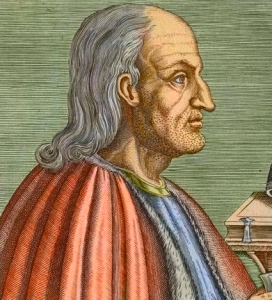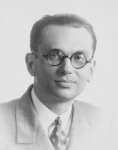Tags

St Anselm
St. Anselm of Canterbury, in his Proslogion, made the first ontological argument, arguing as Wikipedia tells us:
“that than which nothing greater can be conceived”, and argued that this being must exist in the mind; even in the mind of the person who denies the existence of God. He suggested that, if the greatest possible being exists in the mind, it must also exist in reality. If it only exists in the mind, then an even greater being must be possible — one which exists both in the mind and in reality. Therefore, this greatest possible being must exist in reality.
That makes quite a lot of logical sense, at least to me. But it’s been argued down the ages, right until the present day.
 Mathematician and logician Kurt Gödel when he died in 1978, left behind a series of calculations that purport to prove St. Amselm’s thesis. These, in fact:
Mathematician and logician Kurt Gödel when he died in 1978, left behind a series of calculations that purport to prove St. Amselm’s thesis. These, in fact:
“Ax. 1. {P(φ)∧◻∀x[φ(x)→ψ(x)]} →P(ψ)Ax. 2.P(¬φ)↔¬P(φ)Th. 1.P(φ)→◊∃x[φ(x)]Df. 1.G(x)⟺∀φ[P(φ)→φ(x)]Ax. 3.P(G)Th. 2.◊∃xG(x)Df. 2.φ ess x⟺φ(x)∧∀ψ{ψ(x)→◻∀y[φ(y)→ψ(y)]}Ax. 4.P(φ)→◻P(φ)Th. 3.G(x)→G ess xDf. 3.E(x)⟺∀φ[φ ess x→◻∃yφ(y)]Ax. 5.P(E)Th. 4.◻∃xG(x)”.
Don’t look at me like that, nobody promised there wouldn’t be math, and if I had a thirty-foot ladder, well, maybe I could find the bottom of the pool. In any case, some explanatory notes:
Definition 1: x is God-like if and only if x has as essential properties those and only those properties which are positive
Definition 2: A is an essence of x if and only if for every property B, x has B necessarily if and only if A entails B
Definition 3: x necessarily exists if and only if every essence of x is necessarily exemplified
Axiom 1: If a property is positive, then its negation is not positive
Axiom 2: Any property entailed by—i.e., strictly implied by—a positive property is positive
Axiom 3: The property of being God-like is positive
Axiom 4: If a property is positive, then it is necessarily positive
Axiom 5: Necessary existence is positive
Axiom 6: For any property P, if P is positive, then being necessarily P is positive
Theorem 1: If a property is positive, then it is consistent, i.e., possibly exemplified
Corollary 1: The property of being God-like is consistent
Theorem 2: If something is God-like, then the property of being God-like is an essence of that thing
Theorem 3: Necessarily, the property of being God-like is exemplified
My course in introductory logic, and my math courses, both long ago, say that those explanations each and together make sense. But this isn’t new, after all, it came out in 1978.
What is new, is that “Christoph Benzmüller of Berlin’s Free University, who ran the calculations along with Bruno Woltzenlogel Paleo of the Technical University in Vienna, told Spiegel Online: “It’s totally amazing that from this argument led by Gödel, all this stuff can be proven automatically in a few seconds or even less on a standard notebook.”
“I didn’t know it would create such a huge public interest but [Gödel’s ontological proof] was definitely a better example than something inaccessible in mathematics or artificial intelligence…
They do say that, “The point of the researchers’ argument was that they were not directly trying to prove the existence of God, but rather to showcase the power of computers.”
Well, I guess they did both. Still, it’s far enough over my head that I think I’ll take their word for it, and continue to take God on faith, myself. It is interesting, though.
Gene Veith at Cranach, where I found the story, also notes that Gödel was baptized Lutheran, and remained a Bible reading Christian although he was not a member of any church.

This s very timely as I shall be teaching this argument tomorrow. Thanks for this piece, NEO. Very thoughtful.
LikeLiked by 1 person
Have to get lucky once in a while, I reckon. Thanks.
LikeLiked by 1 person
Boolean algebra and standard philosophical notation is something I wish to teach myself during the summer or Easter break. Like learning a language, I suspect I’ll need to commit to some “translation” exercises.
LikeLiked by 1 person
I’ve done some Boolean. It originated (as you probably know) at Bell Labs, as switching algebra to help predict how central station telephony works. My knowledge is both very rudimentary and quite a while ago. Careful, it can be quite fascinating, and is the basis of the whole computerization thing.
Philosophical notation, I have zero knowledge of, and likely never will. 🙂
LikeLiked by 1 person
As with all academic “jargonese”, it’s useful as a time saver and an “international” language. I’ve come across it before when looking at the analysis of argumentation, e.g. the modus tollens and the modus ponens.
LikeLiked by 1 person
I figured as much, and since I interact little with them, I’ll demure. Engineeringese is bad enough!
LikeLiked by 1 person
Great stuff NEO. However I don’t believe that God’s existence can be proved or disproved. If he could be proved then it wouldn’t be god. but some entity in someone’s mind.
“God is not, because God is far beyond affirmation or negation and transcends all opposition between being and non-being.” That was said by Nicholas of Cusa around 1440 AD.
Maximus the Confessor said in 450 AD
“The Perfect mind is the one that through genuine faith knows in supreme ignorance the supremely unknowable and in gazing on the universe of his handiwork has received from God comprehensive knowledge of his Providence and judgement in it as far as is allowable to man.”
That profound wisdom is from his Centuries of Love. ( Philokalia)
I like what Evagrius Ponticus (b.345) said in his Praktikos (Philokalia.)
“God cannot be comprehended by the mind in as much as whatever can be comprehended of God is surely not God.”
LikeLiked by 2 people
That’s where I end up too, Malcolm. Maybe we’re just too obtuse to understand, but I think you’re correct. As I said, Faith will do me.
LikeLiked by 2 people
“Gene Veith at Cranach, where I found the story, also notes that Gödel was baptized Lutheran, and remained a Bible reading Christian although he was not a member of any church.
Surely he was Baptized a Christian. A Lutheran Pastor might have performed the ceremony, but the Waters of Baptism transcend all denominational packages.
LikeLiked by 3 people
You’re right, that’s what I was trying to say. He just didn’t believe in organized churches, a much more rational Bosco, so to speak.
LikeLiked by 2 people
We all need fellowship in faith, the Holy Communion of the Lord’s Supper, Mass or Eucharist to renew our Baptism each week on the Lord’s Day…The Day of the Resurrection. .
LikeLiked by 2 people
I won’t speak for others, but I surely do. All of the above.
LikeLiked by 2 people
Are there any numerical values for psi and theta and phi?
LikeLike
I’m not convinced by the ontological argument. I did write a post on the matter several months ago; however, much of it stems from Aquinas’ influence as believed it to be a poor argument. Aquinas’ cosmological argument is far more convincing in my opinion. However, whatever convinces someone I’ll support to some degree.
LikeLiked by 1 person
Obviously in conflict with Aquinas. Also obviously above my head. I too, believe whatever works, to at least some extent.
LikeLiked by 1 person
We reach a stage in our lives when like the first disciples we accept the invitation of Jesus to come and see (John 1:39)
He becomes the BIG STORY in our lives, a new beginning each day and a love that will not let us go. .
LikeLiked by 1 person